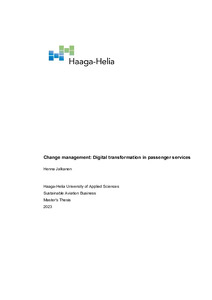Change management: Digital transformation in passenger services
Jalkanen, Henna (2023)
Jalkanen, Henna
2023
All rights reserved. This publication is copyrighted. You may download, display and print it for Your own personal use. Commercial use is prohibited.
Julkaisun pysyvä osoite on
https://urn.fi/URN:NBN:fi:amk-2023052614446
https://urn.fi/URN:NBN:fi:amk-2023052614446
Tiivistelmä
Digitalisation is a megatrend, which is driving organisational change in all industries. Automation and self-service devices are impacting and changing the day-to-day work of the frontline employees, and this brings many challenges to the leaders and the managers. Passenger handling at the airports is no exception and self-service devices have already reshaped the daily work of the frontline employees.
The aim of this thesis was to find out, what kind of issues the employees have faced related to the shift from staffed check-in to self-service check-in devices and to find concrete recommendations, how the leaders and managers can help the frontline employees to adjust to technology-driven change in the future.
The scope of this thesis is limited to the employees, who are working in the passenger services department of the case company and who have experienced the shift from staffed check-in to self-service check-in.
The chosen approach was a case study, and the primary data was collected with mixed methodology, which included semi-structured interviews and a survey conducted with an online survey. Before the primary data collection, a comprehensive literature review was completed. Mixed methodology was chosen in order to gain deeper understanding of the research topic. The primary data was collected during Spring 2023. Eight employees were interviewed, and 121 employees participated in the web-based survey. The interview topics were based on the theoretical framework and the questionnaire was based on the topics that emerged from the thematic analysis of the interviews.
The research showed that the employees faced several issues related to the change to the self-service check-in, such as dealing with the resistance of the passengers and the changed behaviour of the passengers, technological issues with the new technologies, concerns about changes in tasks and about job security, issues related to the communication and especially its lack of interactivity and lack of participation in the development of the change.
The result of the development work was a list of recommendations for similar technological-driven changes in the future. The recommendations include improving software and hardware, more piloting, providing more information about the technologies and the change, providing soft-skill training for the employees, making using the self-service devices voluntary, shorter task lengths involving assisting passengers with the new technologies, improved participation in the development of the change, earlier communication related to the change, offering better ways to give feedback about the change and showing that the feedback is taken seriously.
The aim of this thesis was to find out, what kind of issues the employees have faced related to the shift from staffed check-in to self-service check-in devices and to find concrete recommendations, how the leaders and managers can help the frontline employees to adjust to technology-driven change in the future.
The scope of this thesis is limited to the employees, who are working in the passenger services department of the case company and who have experienced the shift from staffed check-in to self-service check-in.
The chosen approach was a case study, and the primary data was collected with mixed methodology, which included semi-structured interviews and a survey conducted with an online survey. Before the primary data collection, a comprehensive literature review was completed. Mixed methodology was chosen in order to gain deeper understanding of the research topic. The primary data was collected during Spring 2023. Eight employees were interviewed, and 121 employees participated in the web-based survey. The interview topics were based on the theoretical framework and the questionnaire was based on the topics that emerged from the thematic analysis of the interviews.
The research showed that the employees faced several issues related to the change to the self-service check-in, such as dealing with the resistance of the passengers and the changed behaviour of the passengers, technological issues with the new technologies, concerns about changes in tasks and about job security, issues related to the communication and especially its lack of interactivity and lack of participation in the development of the change.
The result of the development work was a list of recommendations for similar technological-driven changes in the future. The recommendations include improving software and hardware, more piloting, providing more information about the technologies and the change, providing soft-skill training for the employees, making using the self-service devices voluntary, shorter task lengths involving assisting passengers with the new technologies, improved participation in the development of the change, earlier communication related to the change, offering better ways to give feedback about the change and showing that the feedback is taken seriously.
